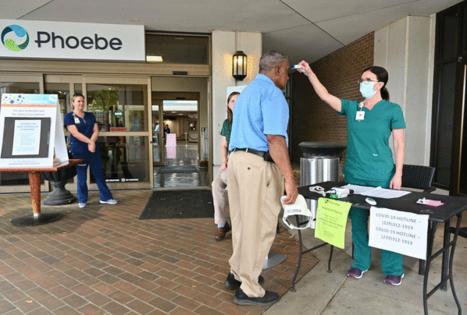Hospitals no longer must report COVID data to CDC, spotlighting clunky system
Published in Health & Fitness
As COVID-19 swept over Phoebe Putney Health System and Southwest Georgia in the first days of the pandemic, residents and public health officials were desperate to know what patients had and how far it was spreading. The Albany, Georgia-based outbreak turned out to be one of the four largest in the world in terms of the percentage of the population infected, along with Wuhan, New York and Northern Italy, and it was only the beginning.
Four years later, a warning system exists, but a big part of it is being switched off. Effective this month, the federal government’s pandemic emergency requirement that all hospitals report their number of COVID-19 patients has expired.
COVID cases are at a low ebb, and the Biden administration last year lifted the pandemic public health emergency orders. By doing that, federal officials estimated that their protective value was no longer worth the extra work and obstacles to daily life that they create. Lifting the emergencies is also acknowledgment of the need to limit government intrusion on rights.
But the CDC and some other public health officials say early warning systems are most valuable before a new emergency arrives. They hope hospitals will still voluntarily report what they’re seeing in COVID data to the CDC, even if they are short-staffed and the reporting takes extra work and time.
And it will take extra work on the ground. Unlike some other highly developed nations, the U.S. public health data system does is clunky.
“We strongly encourage health departments and hospitals to continue reporting respiratory illness data through the National Healthcare Safety Network even though the CMS requirement has ended,” a CDC spokeswoman told The Atlanta Journal-Constitution in a written statement. “That data has significant value for protecting patient health and safety as well as public health.”
Nowadays, Phoebe Putney’s Cynthia Chaney or a couple of her colleagues spend 45 minutes every day typing in numbers by hand to report their COVID-19 case rates and vaccination status to CDC. It took them a month to learn how.
If the CDC system rejects Phoebe’s submission, it takes Chaney and her co-workers more time to troubleshoot why.
That’s par for the course in the jigsaw puzzle of U.S. public health computers. The sprawling collection of states, hospitals and counties with their own computer systems and their own reporting rules are a maze. They take enormous time and work to update.
Public health researchers looking to solve a health problem commonly find the most current national data set is two years old.
...continued
©2024 The Atlanta Journal-Constitution. Visit at ajc.com. Distributed by Tribune Content Agency, LLC.







Comments